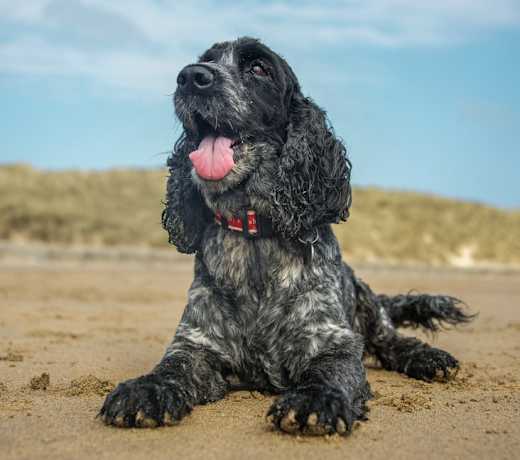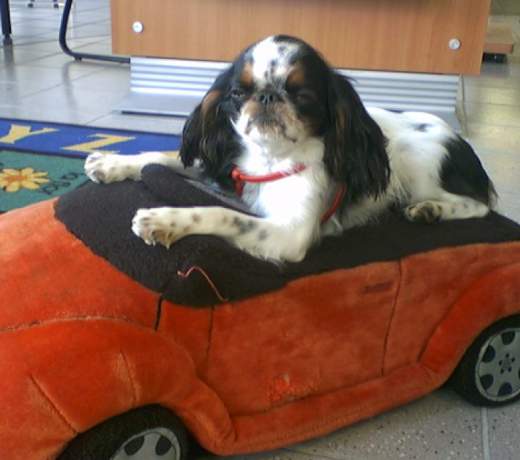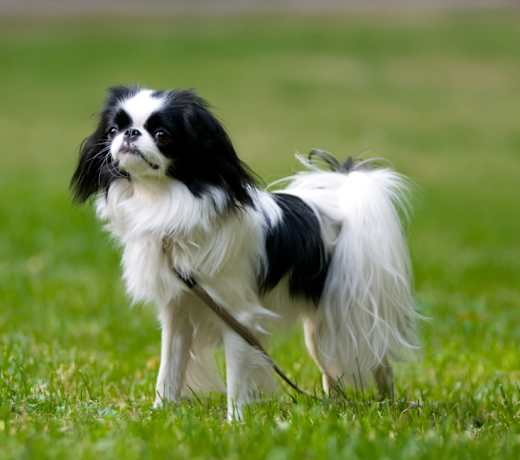Cavalier King Charles Spaniels are small dogs, most weighing 11 to 23 pounds and standing around 12 to 13 inches tall. Their compact size is a distinctive trait of this breed, making them a good choice for those seeking a smaller companion dog.
Cavalier King Charles Spaniel
Breed Type: Toy
Common nicknames: Cavaliers
Coat: Silky
Hypoallergenic: No, they will likely trigger allergies.
Temperament: Gentle, sweet, playful, friendly
Life expectancy: 12-15 years
Color & patterns:
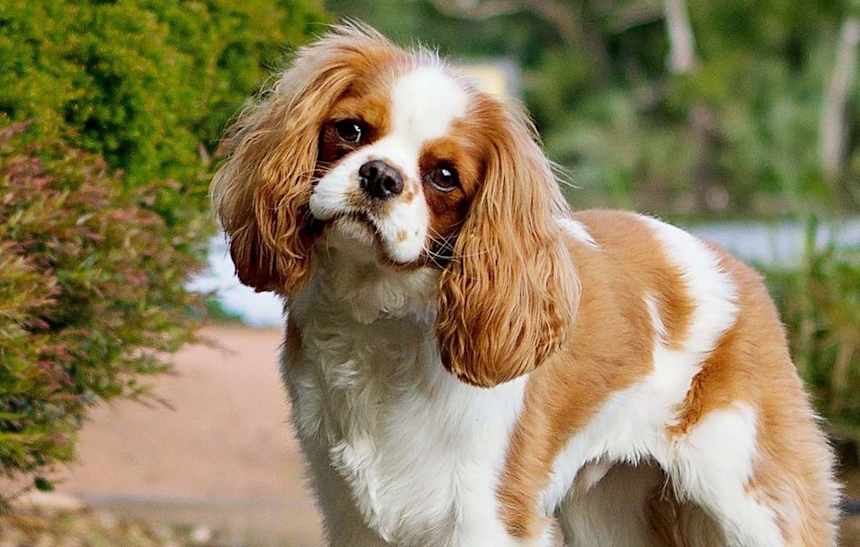
With their big, expressive eyes and infectious enthusiasm, it’s hard not to fall head over heels for the Cavalier King Charles Spaniel. These intelligent pups aren’t just pretty faces — they have a quick wit and an eager-to-please attitude, making them a breeze to train and a delightful companion. Whether mastering new tricks or simply brightening your day with their playful antics, Cavalier King Charles Spaniels are always ready to show off their smarts and are always happy to be by your side, shower you with love, and show off endless tail wags.
Cavalier King Charles Spaniel characteristics
Learn about about Cavalier King Charles Spaniel basics like their fur colors, shedding levels, how much grooming they need, and other Cavalier King Charles Spaniel facts.
Average height
12-13 inches (30.5-33.0cm)
Average weight
11-23 pounds (5.0-10.4 kg)
Average lifespan
12-15 years
Exercise needs
Grooming needs
Full-grown size
Good with cats
Good with kids
Training Aptitude
What colors do Cavalier King Charles come in?
Cavalier King Charles Spaniels come in a variety of colors, among them ruby, black and tan, tricolor, and Blenheim (a combination of chestnut and white).
Do Cavalier King Charles shed?
Yes, Cavalier King Charles Spaniels do shed. Cavaliers are moderate shedders, and their silky, medium-length coat requires regular grooming to manage loose hair and maintain their elegant appearance. Frequent brushing and occasional baths can help keep shedding in check, making them a more manageable choice for people concerned about pet hair.
Are Cavalier King Charles Spaniels double-coated?
No, Cavalier King Charles Spaniels do not have a double coat. Their single coat is typically medium-length, silky, and smooth to the touch, and makes them more suitable for moderate climates (they may be more sensitive to extreme cold or heat). Regular grooming is important to keep their coat healthy and looking their best.
How long do Cavalier King Charles Spaniels live?
Cavalier King Charles Spaniels typically have a lifespan of between nine and 14 years. However, individual longevity can vary based on factors such as genetics, diet, exercise, and overall care.
Are Cavalier King Charles Spaniel hypoallergenic?
No, Cavalier King Charles Spaniels are not considered hypoallergenic. They shed a moderate amount of hair, and while their coat is beautiful, it can potentially trigger allergies in individuals who are sensitive to dog dander. If someone in your household has allergies, it’s essential to take this into account when considering this breed as a pet.
How many types of Cavalier King Charles Spaniels are there?
There’s only one type of Cavalier King Charles Spaniel, but the breed comes in four distinct color patterns: Blenheim, tricolor, black and tan, and ruby. Despite these variations in coat colors, their core breed characteristics remain consistent.
These pups are often (and easily) confused with the King Charles Spaniel as they are descendants of the same breed, but there is just one type of Cavalier King Charles Spaniel.
Cavalier King Charles Spaniel temperament
Learn about about the Cavalier King Charles Spaniel temperament and how well they fit into your lifestyle, home environment, and family.
Are Cavalier King Charles Spaniels good apartment dogs?
Yes, Cavalier King Charles Spaniels make good apartment dogs. These dogs are relatively small and not overly active, so they do well in smaller living spaces, but they do appreciate their daily walks and playtime. Regular exercise is important to keep them happy and healthy, so be ready to take them for strolls in the neighborhood or visits to a nearby park.
Are Cavalier King Charles Spaniels good with kids?
Yes, Cavalier King Charles Spaniels are good with children as they are gentle and playful. Because they are on the smaller side, though, it is best when the kids are taught to be gentle with them so as to avoid any accidental injury.
As with any breed, it is recommended that your child is always supervised when interacting with your Cavalier King Charles Spaniel to keep both the child and dog safe. It's also important for pet parents to teach their dogs how to gently interact with children.
Are Cavalier King Charles Spaniels easy to train?
Cavalier King Charles Spaniels have very eager-to-please personalities, but they can sometimes pose a challenge to train because they have distractible attention spans. That said, training any dog takes substantial time and effort, regardless of breed. A particularly patient, nurturing trainer is best for this breed.
Do Cavalier King Charles Spaniels bark a lot?
No, Cavalier King Charles Spaniels are not known for excessive barking. They tend to be a relatively quiet and well-mannered breed.
That said, Cavalier King Charles Spaniels crave and require human companionship — more so than most other breeds. If they are separated from their humans for too long, they tend to express their anxiety by barking. As with any dog, they can be discouraged from barking as frequently with proper training, attention, and exercise.
What’s the difference between a Cavalier and a King Charles Spaniel?
The difference between a Cavalier and a King Charles Spaniel is that Cavaliers are often a bit larger, with a wavy, silky coat and a longer snout. King Charles Spaniels, on the other hand, have a smaller body and facial features and come in four specific colors: Blenheim, tricolor, black & tan, and ruby.
Are King Charles Cavaliers good pets?
Yes, Cavalier King Charles Spaniels make good pets. These dogs are known for their affectionate nature and friendly disposition, and are well-suited for families and individuals alike. Their loyalty and adaptability make them great additions to various living situations.
But, like any breed, it’s important to remember that individual personalities can vary. Proper training, socialization, and care are key to ensuring they become well-behaved and happy members of your household.
Are Cavalier King Charles Spaniels smart?
Yes, Cavalier King Charles Spaniels are smart. These pups are quick learners when it comes to basic obedience and commands, have a knack for picking up on their people’s emotions, and are known to be excellent at providing comfort and companionship.
Are Cavalier King Charles Spaniels good dogs?
Yes, Cavalier King Charles Spaniels are good dogs. Often referred to as “comforter spaniels,” Cavalier King Charles Spaniels were bred to be gentle, sweet lap-dogs for members of the Royal Court and are friendly and charming to this day.
Are Cavalier King Charles Spaniels good with cats?
Yes, Cavalier King Charles Spaniels are known to be good with cats. Their friendly and adaptable nature typically makes them open to forming positive relationships with other animals, including cats.
Of course, successful cat-dog interactions often depend on the individual personalities and temperaments of both the dog and the cat. But you can feel fairly confident that if properly socialized to your cat and/or introduced at a young age, your Cavalier King Charles Spaniel should get along just swell.
Cavalier King Charles Spaniel history
Learn about where the Cavalier King Charles Spaniel came from.
Where did the Cavalier King Charles Spaniel come from?
The Cavalier King Charles Spaniel originated in the United Kingdom during the 17th century. They were named after King Charles II, who was particularly fond of these small pups. In the 19th century, there was a shift towards breeding smaller dogs with flatter faces, which led to the development of the modern Cavalier King Charles Spaniel.
Cavalier King Charles Spaniel health
Learn about about the Cavalier King Charles Spaniel health outlook and what diseases they may be prone to at various stages of their life.
Are Cavalier King Charles Spaniels brachycephalic?
Yes, Cavalier King Charles Spaniels are considered brachycephalic. Cavaliers have a “flat-face” but do not have extreme brachycephalic features such as Pugs and Japanese Chins. These pups have a more balanced cranial shape, allowing for healthier breathing and fewer of the snorting sounds associated with their brachycephalic counterparts.
Do Cavalier King Charles Spaniels need grooming?
Yes, Cavalier King Charles Spaniels do require regular grooming. While they have a single coat that doesn’t shed excessively, their silky fur can become tangled, matted, and dirty if not properly cared for. Regular brushing, ideally a few times a week, helps keep their coat in good condition and reduces shedding. Additionally, occasional baths and hair trims, nail trimming, and ear cleaning are essential parts of their grooming routine to ensure they remain healthy and comfortable.
Do Cavalier King Charles Spaniels have health problems?
Cavalier King Charles Spaniels don’t have a lot of health problems and are remarkably sturdy for their size, though a propensity for heart disease tends to shorten the median life expectancy of this breed to around ten years.
Hip Dysplasia: Hip and elbow dysplasia are two of the most common skeletal diseases seen in dogs. They are similar diseases in which either the hip or elbow joint has grown abnormally or is misshapen. The abnormal shape prevents the joints and sockets from properly meeting, resulting in rubbing and grinding instead of sliding smoothly.
Elbow Dysplasia: Unlike hip dysplasia, where the main problem is joint instability, the abnormalities seen in elbow dysplasia often result in pieces of bone and/or cartilage breaking loose and irritating the joint tissues.
Episodic Falling: This condition has symptoms similar to epilepsy, but the dog remains conscious during the seizure-like episodes. A dog suffering from episodic falling will have periods where they cannot relax their muscles. During an episode, their limbs will become rigid, they will lose coordination, and they may fall. Symptoms usually start before five months of age.
Syringomyelia (SM): This condition affects the brain and spinal cord and is caused by a malformation of the skull. The result is a skull that is too small for the brain, making it difficult for spinal fluid to properly travel down the spine. The fluid eventually backs up near the neck and creates cysts. Symptoms range from mild discomfort to severe pain and partial paralysis. You might notice sensitivity around your dog’s head, neck, or shoulders, and he may frequently scratch at the area of their neck or shoulder.
Heart problems: Mitral Valve Disease is a condition where the valve directing blood from the left atrium to the left ventricle begins to fail and eventually leads to heart failure. Though there is no cure for mitral valve disease, there are medications to help slow progression and allow a good quality of life. Congestive heart failure is also a concern.
Others: Patellar luxation, a common problem where the kneecap slips out of place; dry eye; and other ear and eye disorders. To identify some of these issues, a veterinarian may recommend joint, heart, and DNA tests for the dog.
If you are rescuing a Cavalier King Charles Spaniel, have them checked out by a vet to see if they are prone to getting these health problems.
Popular Cavalier King Charles Spaniel mixes
A few common Cavalier King Charles Spaniel mixes include:
Cav-A-Jack (Cavalier King Charles Spaniel + Jack Russell Terrier)
Cava-Chin (Cavalier King Charles Spaniel + Japanese Chin)
Cava-Lon (Cavalier King Charles Spaniel + Papillon)
Chilier (Chihuahua + Cavalier King Charles Spaniel)
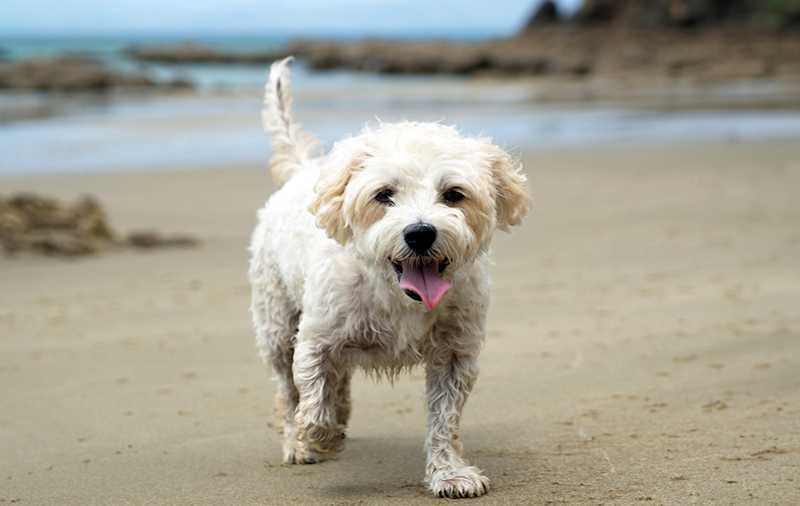
Find Cavalier King Charles Spaniel puppies near you
Adopting a Cavalier King Charles Spaniel
Learn about acquiring a Cavalier King Charles Spaniel - the pros and cons of adopting versus going through a breeder, and associated costs.
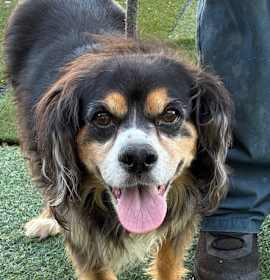
Riley
Cavalier King Charles Spaniel
Male, 9 yrs
Canoga Park, CA
Spayed or Neutered
Shots are up-to-date

Mia
Cavalier King Charles Spaniel
Female, 9 yrs
Canoga Park, CA
Spayed or Neutered
Shots are up-to-date

Gregory
Cavalier King Charles Spaniel
Male, adult
San Gabriel, CA

Lilli
Cavalier King Charles Spaniel
Female, adult
Palos Verdes Peninsula, CA
Spayed or Neutered
Shots are up-to-date

Moose
Cavalier King Charles Spaniel
Male, 1 yr
San Pedro, CA
Good with dogs
Good with cats
Shots are up-to-date

Mowglie
Cavalier King Charles Spaniel
Male, 2 yrs
San Pedro, CA
Good with dogs
Good with cats
Shots are up-to-date

Moose
Cavalier King Charles Spaniel
Male, 1 yr
San Pedro, CA
Good with dogs
Good with cats
Shots are up-to-date

Mash
Cavalier King Charles Spaniel
Male, 2 yrs
San Pedro, CA
Good with dogs
Good with cats
Shots are up-to-date

Riley
Cavalier King Charles Spaniel
Male, 9 yrs
Canoga Park, CA
Spayed or Neutered
Shots are up-to-date

Mia
Cavalier King Charles Spaniel
Female, 9 yrs
Canoga Park, CA
Spayed or Neutered
Shots are up-to-date

Gregory
Cavalier King Charles Spaniel
Male, adult
San Gabriel, CA

Lilli
Cavalier King Charles Spaniel
Female, adult
Palos Verdes Peninsula, CA
Spayed or Neutered
Shots are up-to-date

Moose
Cavalier King Charles Spaniel
Male, 1 yr
San Pedro, CA
Good with dogs
Good with cats
Shots are up-to-date

Mowglie
Cavalier King Charles Spaniel
Male, 2 yrs
San Pedro, CA
Good with dogs
Good with cats
Shots are up-to-date

